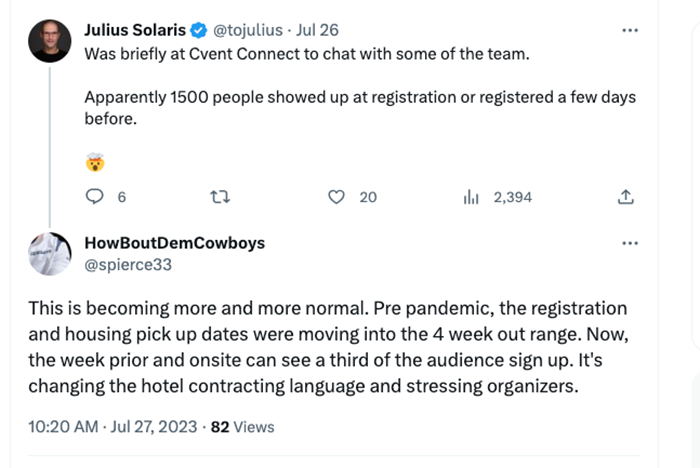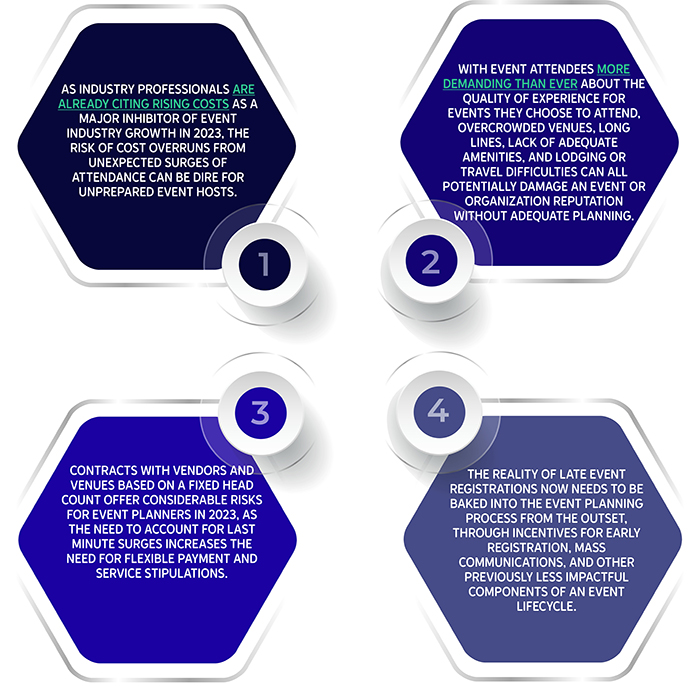Adam Hausman

Adam Hausman is a co-founder of RSVPify, a leading event management software platform. He lives in Chicago with his wife and very opinionated 16-month-old daughter.

As the events industry continues to experience a significant bounce back after the COVID-19 pandemic, it’s no surprise that not everything is coming back easily. For some companies, it’s navigating the rapid surge back to in-person events after spending significant time and resources on developing virtual or hybrid infrastructure.
For others, it’s identifying new preferences of attendees for how event software is integrated into their event experience. Likewise, new expectations around the purpose of events and personalization of the event experience are also throwing event planners for a loop.
Another challenging but promising trend as the event industry surges back has been a noticeable trend toward last-minute surges in day-of and online event registration. Whereas previously, companies and event planners could often finalize a guest list weeks or even months before an event with the confidence of a fixed headcount, event professionals are noting recently that last-minute additions of hundreds or even thousands of event attendees at major events have become more and more normal.

This trend isn’t just being noticed by event professionals on social media. A variety of industry publications have started to take note:
There are a variety of concerns for event planners to keep aware of as this trend in late registrations continues to emerge:

What should event planners do to adapt to the surge of late event registration in 2023?
The optimistic view of the rise of surges in late event registration is that interest in attending in-person events is rapidly rising back to pre-pandemic levels (and perhaps soon to exceed them). This means that event planners should view this trend as one of opportunity — if the right steps are taken to incorporate this trend into the event planning process from the outset. But what are the essential steps to take to accomplish this?
Build flexibility into your event planning from the outset. While in the past, event planners would often operate on a single plan built around an expected headcount, increasing variability in attendance means that event planners are better served operating with a range of expected attendance. This may mean creating A/B/C attendance plans, which can allow you to anticipate the crucial decisions to be made at each step of the planning process as registration rises or falls between levels.
Emphasize flexibility as you negotiate vendor and venue contracts. From securing different potential spaces in a venue to best fit different potential headcounts to ensuring vendors are able to deliver greater amounts of supplies, food, beverage or amenities as the date gets closer and registration numbers are more stable, flexibility is paramount in event contracts in 2023. This might take the form of higher deposits in exchange for greater flexibility closer to the event, securing guarantees from vendors or venues to adjust for unexpected late surges of attendance, or potentially lining up backup vendors or venues in case of a massive increase in expected attendees.
Set reasonable and clear expectations with attendees if attendance is much higher than anticipated. No one wants to be surprised with logistical or experiential issues when they’ve committed time, money and energy to attending your event. That’s why being upfront with your guestlist if some elements of the event experience may need to be adjusted due to unexpected surges in attendance is critical. Allow guests the ability to adjust their event experience as much as possible or ensure they take advantage of pre-registration to avoid long lines upon entry. Allow guests to pre-order meals or packages to guarantee their experience while communicating with late registrants they might not gain access to all elements of an event without earlier registration. Clear communication can help avoid unexpected surprises for guests and event planners alike or at least ensure people arrive at the event with reasonable expectations for their experience.
Consider designating or hiring additional staff to manage increased attendance. Much like vendor or venue contracts, staffing plans in the past were often developed months before an event would take place. However, event planners should strongly consider budgeting for additional on-site staffing for registration, attendee experience or vendor support to account for the rising late registration trend. Ideally, event planners should schedule a staff meeting within days of the event to adjust roles and incorporate new team members into the updated attendee list. This can help event hosts have more support “on the ground” to accommodate late surges in attendance instead of scrambling to move staff around at the event itself.
Incorporate real-time event analytics and event software to better respond to audience sentiments. Sentiment analysis has come a long way in recent years, and there are more event software tools than ever to allow event hosts to measure event experience and address event management concerns in real-time. While this may require an investment, the ability to better track audience issues before they appear on social media and impact an event or host brand is essential with the rise of late surges in event attendance.
Don’t miss any event-related news: Sign up for our weekly e-newsletter HERE, listen to our latest podcast HERE and engage with us on Twitter, Facebook and LinkedIn!

Add new comment